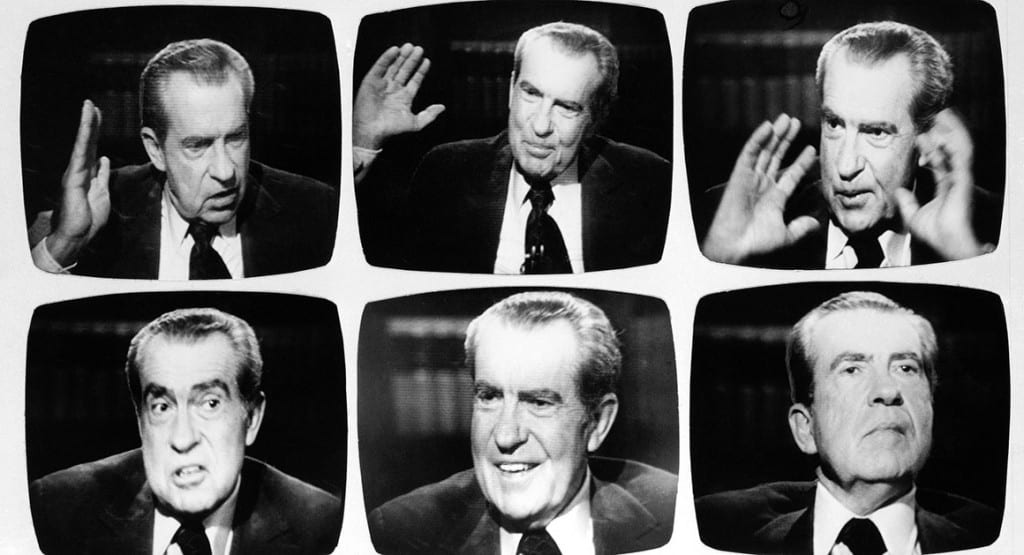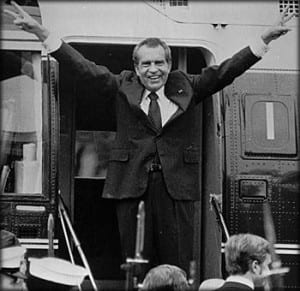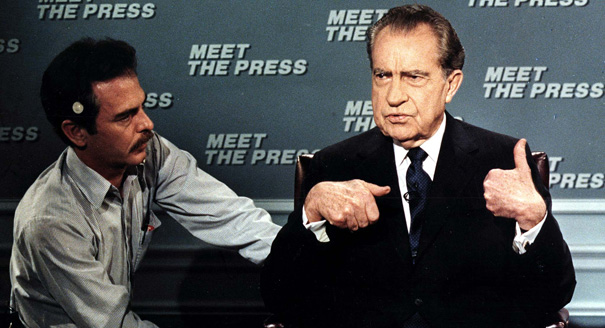The Big Picture –
By Glynn Wilson –
Richard Milhous Nixon hated the limelight, perhaps for good reason. When it shined down upon him like a police cruiser spotlight on a rabid dog, what it showed was not something to make the American people proud. He would have been a more powerful and successful politician in the days of the smoke-filled room.
It’s not just that the advent of television did Nixon in. That may be the best thing television has ever done for the American people, and the story is the prime example and one of the few cases in which “the press” in this country actually did the job it is supposed to do with its special rights under the First Amendment to the U.S. Constitution. It is one of the few times in our history when a newspaper actually played the watchdog role to the hilt. We have Katharine Meyer Graham and Ben Bradlee to thank for that, along with Woodward and Bernstein.
The story has already been told on how the limelight found Nixon, and what it did to him. Now on the 40th anniversary of his resignation as president on August 9, 1974, perhaps enough time has gone by that we can focus on the damage he did to the country and to democracy itself.
Richard Cohen takes Nixon apart in a Washington Post column under the headline: Richard Nixon’s lasting damage to the GOP. It is only fitting that the newspaper that did the most yeoman’s work to bring Nixon down would dominate the coverage of his legacy.
But my thinking is, who cares about how he harmed the Republican Party? He actually borrowed from the script of Alabama’s George Corley Wallace — who he feared – and helped the so-called GOP, short for Grand Old Party. (Don’t you love it when a journalist uses a politician’s funny middle name to help diminish them?).
What we should be shining the limelight on is how Nixon damaged us all.
If you take a look at the section on the Wikipedia page on Nixon’s legacy, what you will find is a typically shallow two-sided take on the subject. It is a good starting point for people doing basic Web research to learn about those days, but even the biographies try to be fair and balanced toward Nixon.
Hey, call me a liberal-socialist-commie conspiracy nut if you want, but I think in Oliver Stone’s film Nixon, Anthony Hopkins probably shows us a more accurate picture of the real Nixon than any two-sided biography or newspaper column ever could.
Of course predictably, two days before the film was released in theaters, the Richard Nixon Library and birthplace in Yorba Linda, California issued a statement on behalf of the Nixon family, calling parts of the film “reprehensible” and said that it was designed to “defame and degrade President and Mrs. Nixon’s memories in the mind of the American public.”
No, that’s not the purpose of films. The purpose of film is to dig into the research and come up with an accurate portrayal of someone’s life and times. It was Nixon himself who was in fact “reprehensible.” And as a discredited public figure he deserved to be defamed and degraded “in the mind of the American public.”
Even allowing some people to hold onto the view that Nixon had some good side would be a disservice to American democracy and the ideal of a free, objective press itself.
I was only 16-years-old when Nixon went on national television and declared he was not a crook, but of course we eventually found out he was the worst kind of crook there is: Someone the people intrust with the highest office in the land who uses that office not just like a bully pulpit, which is understandable. We know from the tapes that he used his office like some insecure, psychopathic Mob boss to undermine the democratic process at every turn.
One would like to think that in the age of the Internet, we can prevent crooks like Nixon from ever getting elected to high office in the first place. It took newspaper reporters way too long to get the word out on Nixon.
For all his talk about protecting the office of the president and the presidency itself, his actions did more to harm the presidency than anyone who has ever held the office.
He was a foul creature who should be remembered as such. End of story.
More News


















As for his so-called “environmental legacy,” Nixon didn’t create the EPA and push for passage of the Clean Air and Water Acts because of his love of the environment. He did it because of massive public pressure and press coverage, which he responded to as a politician hoping people would like and support him. Obviously in his case, his other actions made any good thing that happened during his administration moot.
HE WAS A CROOK
by Hunter S. Thompson
MEMO FROM THE NATIONAL AFFAIRS DESK DATE: MAY 1, 1994 FROM: DR. HUNTER S. THOMPSON SUBJECT: THE DEATH OF RICHARD NIXON: NOTES ON THE PASSING OF AN AMERICAN MONSTER…. HE WAS A LIAR AND A QUITTER, AND HE SHOULD HAVE BEEN BURIED AT SEA…. BUT HE WAS, AFTER ALL, THE PRESIDENT.
“And he cried mightily with a strong voice, saying, Babylon the great is fallen, is fallen, and is become the habitation of devils, and the hold of every foul spirit and a cage of every unclean and hateful bird.”
—Revelation 18:2
Richard Nixon is gone now, and I am poorer for it. He was the real thing — a political monster straight out of Grendel and a very dangerous enemy. He could shake your hand and stab you in the back at the same time. He lied to his friends and betrayed the trust of his family. Not even Gerald Ford, the unhappy ex-president who pardoned Nixon and kept him out of prison, was immune to the evil fallout. Ford, who believes strongly in Heaven and Hell, has told more than one of his celebrity golf partners that “I know I will go to hell, because I pardoned Richard Nixon.”
I have had my own bloody relationship with Nixon for many years, but I am not worried about it landing me in hell with him. I have already been there with that bastard, and I am a better person for it. Nixon had the unique ability to make his enemies seem honorable, and we developed a keen sense of fraternity. Some of my best friends have hated Nixon all their lives. My mother hates Nixon, my son hates Nixon, I hate Nixon, and this hatred has brought us together.
Nixon laughed when I told him this. “Don’t worry,” he said, “I, too, am a family man, and we feel the same way about you.”
It was Richard Nixon who got me into politics, and now that he’s gone, I feel lonely. He was a giant in his way. As long as Nixon was politically alive — and he was, all the way to the end — we could always be sure of finding the enemy on the Low Road. There was no need to look anywhere else for the evil bastard. He had the fighting instincts of a badger trapped by hounds. The badger will roll over on its back and emit a smell of death, which confuses the dogs and lures them in for the traditional ripping and tearing action. But it is usually the badger who does the ripping and tearing. It is a beast that fights best on its back: rolling under the throat of the enemy and seizing it by the head with all four claws.
That was Nixon’s style — and if you forgot, he would kill you as a lesson to the others. Badgers don’t fight fair, bubba. That’s why God made dachshunds.
Nixon was a navy man, and he should have been buried at sea. Many of his friends were seagoing people: Bebe Rebozo, Robert Vesco, William F. Buckley Jr., and some of them wanted a full naval burial.
These come in at least two styles, however, and Nixon’s immediate family strongly opposed both of them. In the traditionalist style, the dead president’s body would be wrapped and sewn loosely in canvas sailcloth and dumped off the stern of a frigate at least 100 miles off the coast and at least 1,000 miles south of San Diego, so the corpse could never wash up on American soil in any recognizable form.
The family opted for cremation until they were advised of the potentially onerous implications of a strictly private, unwitnessed burning of the body of the man who was, after all, the President of the United States. Awkward questions might be raised, dark allusions to Hitler and Rasputin. People would be filing lawsuits to get their hands on the dental charts. Long court battles would be inevitable — some with liberal cranks bitching about corpus delicti and habeas corpus and others with giant insurance companies trying not to pay off on his death benefits. Either way, an orgy of greed and duplicity was sure to follow any public hint that Nixon might have somehow faked his own death or been cryogenically transferred to fascist Chinese interests on the Central Asian Mainland.
It would also play into the hands of those millions of self-stigmatized patriots like me who believe these things already.
If the right people had been in charge of Nixon’s funeral, his casket would have been launched into one of those open-sewage canals that empty into the ocean just south of Los Angeles. He was a swine of a man and a jabbering dupe of a president. Nixon was so crooked that he needed servants to help him screw his pants on every morning. Even his funeral was illegal. He was queer in the deepest way. His body should have been burned in a trash bin.
These are harsh words for a man only recently canonized by President Clinton and my old friend George McGovern — but I have written worse things about Nixon, many times, and the record will show that I kicked him repeatedly long before he went down. I beat him like a mad dog with mange every time I got a chance, and I am proud of it. He was scum.
Let there be no mistake in the history books about that. Richard Nixon was an evil man — evil in a way that only those who believe in the physical reality of the Devil can understand it. He was utterly without ethics or morals or any bedrock sense of decency. Nobody trusted him — except maybe the Stalinist Chinese, and honest historians will remember him mainly as a rat who kept scrambling to get back on the ship.
It is fitting that Richard Nixon’s final gesture to the American people was a clearly illegal series of 21 105-mm howitzer blasts that shattered the peace of a residential neighborhood and permanently disturbed many children. Neighbors also complained about another unsanctioned burial in the yard at the old Nixon place, which was brazenly illegal. “It makes the whole neighborhood like a graveyard,” said one. “And it fucks up my children’s sense of values.”
Many were incensed about the howitzers — but they knew there was nothing they could do about it — not with the current president sitting about 50 yards away and laughing at the roar of the cannons. It was Nixon’s last war, and he won.
The funeral was a dreary affair, finely staged for TV and shrewdly dominated by ambitious politicians and revisionist historians. The Rev. Billy Graham, still agile and eloquent at the age of 136, was billed as the main speaker, but he was quickly upstaged by two 1996 GOP presidential candidates: Sen. Bob Dole of Kansas and Gov. Pete Wilson of California, who formally hosted the event and saw his poll numbers crippled when he got blown off the stage by Dole, who somehow seized the No. 3 slot on the roster and uttered such a shameless, self-serving eulogy that even he burst into tears at the end of it.
Dole’s stock went up like a rocket and cast him as the early GOP front-runner for ’96. Wilson, speaking next, sounded like an Engelbert Humperdinck impersonator and probably won’t even be re-elected as governor of California in November.
The historians were strongly represented by the No. 2 speaker, Henry Kissinger, Nixon’s secretary of state and himself a zealous revisionist with many axes to grind. He set the tone for the day with a maudlin and spectacularly self-serving portrait of Nixon as even more saintly than his mother and as a president of many godlike accomplishments — most of them put together in secret by Kissinger, who came to California as part of a huge publicity tour for his new book on diplomacy, genius, Stalin, H. P. Lovecraft and other great minds of our time, including himself and Richard Nixon.
Kissinger was only one of the many historians who suddenly came to see Nixon as more than the sum of his many squalid parts. He seemed to be saying that History will not have to absolve Nixon, because he has already done it himself in a massive act of will and crazed arrogance that already ranks him supreme, along with other Nietzschean supermen like Hitler, Jesus, Bismarck and the Emperor Hirohito. These revisionists have catapulted Nixon to the status of an American Caesar, claiming that when the definitive history of the 20th century is written, no other president will come close to Nixon in stature. “He will dwarf FDR and Truman,” according to one scholar from Duke University.
It was all gibberish, of course. Nixon was no more a Saint than he was a Great President. He was more like Sammy Glick than Winston Churchill. He was a cheap crook and a merciless war criminal who bombed more people to death in Laos and Cambodia than the U.S. Army lost in all of World War II, and he denied it to the day of his death. When students at Kent State University, in Ohio, protested the bombing, he connived to have them attacked and slain by troops from the National Guard.
Some people will say that words like scum and rotten are wrong for Objective Journalism — which is true, but they miss the point. It was the built-in blind spots of the Objective rules and dogma that allowed Nixon to slither into the White House in the first place. He looked so good on paper that you could almost vote for him sight unseen. He seemed so all-American, so much like Horatio Alger, that he was able to slip through the cracks of Objective Journalism. You had to get Subjective to see Nixon clearly, and the shock of recognition was often painful.
Nixon’s meteoric rise from the unemployment line to the vice presidency in six quick years would never have happened if TV had come along 10 years earlier. He got away with his sleazy “my dog Checkers” speech in 1952 because most voters heard it on the radio or read about it in the headlines of their local, Republican newspapers. When Nixon finally had to face the TV cameras for real in the 1960 presidential campaign debates, he got whipped like a red-headed mule. Even die-hard Republican voters were shocked by his cruel and incompetent persona. Interestingly, most people who heard those debates on the radio thought Nixon had won. But the mushrooming TV audience saw him as a truthless used-car salesman, and they voted accordingly. It was the first time in 14 years that Nixon lost an election.
When he arrived in the White House as VP at the age of 40, he was a smart young man on the rise — a hubris-crazed monster from the bowels of the American dream with a heart full of hate and an overweening lust to be President. He had won every office he’d run for and stomped like a Nazi on all of his enemies and even some of his friends.
Nixon had no friends except George Will and J. Edgar Hoover (and they both deserted him). It was Hoover’s shameless death in 1972 that led directly to Nixon’s downfall. He felt helpless and alone with Hoover gone. He no longer had access to either the Director or the Director’s ghastly bank of Personal Files on almost everybody in Washington.
Hoover was Nixon’s right flank, and when he croaked, Nixon knew how Lee felt when Stonewall Jackson got killed at Chancellorsville. It permanently exposed Lee’s flank and led to the disaster at Gettysburg.
For Nixon, the loss of Hoover led inevitably to the disaster of Watergate. It meant hiring a New Director — who turned out to be an unfortunate toady named L. Patrick Gray, who squealed like a pig in hot oil the first time Nixon leaned on him. Gray panicked and fingered White House Counsel John Dean, who refused to take the rap and rolled over, instead, on Nixon, who was trapped like a rat by Dean’s relentless, vengeful testimony and went all to pieces right in front of our eyes on TV.
That is Watergate, in a nut, for people with seriously diminished attention spans. The real story is a lot longer and reads like a textbook on human treachery. They were all scum, but only Nixon walked free and lived to clear his name. Or at least that’s what Bill Clinton says — and he is, after all, the President of the United States.
Nixon liked to remind people of that. He believed it, and that was why he went down. He was not only a crook but a fool. Two years after he quit, he told a TV journalist that “if the president does it, it can’t be illegal.”
Shit. Not even Spiro Agnew was that dumb. He was a flat-out, knee-crawling thug with the morals of a weasel on speed. But he was Nixon’s vice president for five years, and he only resigned when he was caught red-handed taking cash bribes across his desk in the White House.
Unlike Nixon, Agnew didn’t argue. He quit his job and fled in the night to Baltimore, where he appeared the next morning in U.S. District Court, which allowed him to stay out of prison for bribery and extortion in exchange for a guilty (no contest) plea on income-tax evasion. After that he became a major celebrity and played golf and tried to get a Coors distributorship. He never spoke to Nixon again and was an unwelcome guest at the funeral. They called him Rude, but he went anyway. It was one of those Biological Imperatives, like salmon swimming up waterfalls to spawn before they die. He knew he was scum, but it didn’t bother him.
Agnew was the Joey Buttafuoco of the Nixon administration, and Hoover was its Caligula. They were brutal, brain-damaged degenerates worse than any hit man out of The Godfather, yet they were the men Richard Nixon trusted most. Together they defined his Presidency.
It would be easy to forget and forgive Henry Kissinger of his crimes, just as he forgave Nixon. Yes, we could do that — but it would be wrong. Kissinger is a slippery little devil, a world-class hustler with a thick German accent and a very keen eye for weak spots at the top of the power structure. Nixon was one of those, and Super K exploited him mercilessly, all the way to the end.
Kissinger made the Gang of Four complete: Agnew, Hoover, Kissinger and Nixon. A group photo of these perverts would say all we need to know about the Age of Nixon.
Nixon’s spirit will be with us for the rest of our lives — whether you’re me or Bill Clinton or you or Kurt Cobain or Bishop Tutu or Keith Richards or Amy Fisher or Boris Yeltsin’s daughter or your fiancee’s 16-year-old beer-drunk brother with his braided goatee and his whole life like a thundercloud out in front of him. This is not a generational thing. You don’t even have to know who Richard Nixon was to be a victim of his ugly, Nazi spirit.
He has poisoned our water forever. Nixon will be remembered as a classic case of a smart man shitting in his own nest. But he also shit in our nests, and that was the crime that history will burn on his memory like a brand. By disgracing and degrading the Presidency of the United States, by fleeing the White House like a diseased cur, Richard Nixon broke the heart of the American Dream.